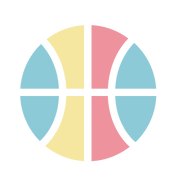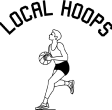What inspired your love for the game?
My dad was a coach. He played in high school and college, so he brought me to the gym. I think, sometimes, you're a product of your environment; you become who you hang out with. I fell in love with it. I wasn't very good at it but I worked and I earned success. I was one of the only salts in the pepper shaker: I was the only white boy on my team all through high school till my first year in college. I had to earn everything. I learned a lot of lessons about diversity and adversity.
The love I had for the game is an agape love which means unconditional Christ-like love for the church. There's nothing basketball could do or will do that will deter my love from it. I've been involved with basketball since I was eight years old. I'm 50 now. That's 42 years of ups and downs and all around with basketball. I've never left it; I built my life on it.

What inspires and drives your career in basketball entrepreneurship?
For me, the best job in the world is playing hoops. If not that then, train or coach, you know? I'm a hooper. I love hoops and once I couldn't do that anymore I got into coaching.
I didn't like college coaching because there were a lot of restrictions. I coached in college for about six years and didn't get enough basketball. I said to myself, “You know what? let me work for myself let me get a system where I could create, I guess if you will, my own ceiling.” There is no ceiling for success when you're an entrepreneur; you don't have any systems keeping you down. So, I created a private basketball industry where after school you go train and on weekends you go train.
Before social media, I built this wonderful occupation by grinding, going to 50 countries across six continents. I'm heading to my 51st country in June. I read The Purpose Driven Life by Rick Warren and The Prayer of Jabez by Bruce Wilkerson, grabbed a legal pad, and just started writing. Where there is no vision, the people perish. I had a vision and imagination. Einstein said, “imagination is more important than knowledge.” I had an imagination. I decided I'm not gonna do something I like or play it safe just to get comfortable.
I have a masters in education so I'm not just a jock. I'm an educator. I wanted to do something that I was passionate about, something where I could really make a difference in people's lives. I wrote down my mission statement and it's to help you win in basketball and win in life. There are a lot of problems in our industry with trainers teaching kids drills and not teaching them skills and then there's a huge problem in life where we get distracted by being in the dungeon of depression. We could go into it but I've lost a lot of players and coaches that I've mentored to suicide. I just think if you're an expert or have a platform then you need to use that to teach these young people who they are, what they can become, and contribute to being a great pillar in society. A living trophy you know what I mean? So that's what I did in 2000 and that's how I got interested in it. People liked it and now I’m here.

You’ve been a proven player development coach for over a decade. What is your approach to PD overall?
I evaluate them and I teach three things: offense, defense, and culture. I use the basic moves and counters, team concepts, etc. You do that through repetition drills working on mechanics and form. Then you have to get them to do it at game speed. Then you add pressure: you take away the cones and you add the bones. You see if they can do it against flesh in real action in the game. You see if they can do it against better players or coaches.
Once you get the physical down, you watch their minds and emotions. How’s their attitude or body language? Are they great teammates? Are they having fun? Are they listening? Are they accountable? Are they disciplined? Then you go in further and you start watching them after practice. See if they come early to the gym. Before practice, you start a conversation with them. Take them out to dinner and see what kind of human they are. Basically, it's a holistic approach that I try to have.

With the game evolving so much, how are you staying current with the latest techniques and teachings of the game?
I read the room, watch basketball on TV, talk to coaches, and ask them what their current trends or current problems are. Stay present! When you go train, stay in the moment. The most important power in the world is that hour you're in the gym and you stay present. Read and take notes, and you go from there.
Honestly, it's a simple game. I mean a lot of the problems that kids are having holistically they had back when I played in the 1980s. It's not a difficult game. Yeah, some actions, transition offense, spacing, positionless players, talent, and the way the game is played have changed. But as far as skills go, kids had to be able to shoot in the 1960s. They had bad body language in the 1970s. There were confrontational problems with players and coaches in the 1990s. Kids struggled with the pressure back in the early 2000s. We have all of that still today.
I think it's harder for a kid to grow up now than it was twenty years ago for sure. However, there's still pressure. There are always going to be the same problems but with technology and information, as people get smarter, I think we'll have more solutions to choose from. That's a whole other problem, there's so much information out there it's hard for coaches and players to have applications. I struggle with that too! Figuring out which way I don't want to go. I got all this information, which do I want to apply to? If any leader or coach out there wants to be better it's figuring out the application of your information. What are you actually going to apply and what are you going to stick with in terms of your philosophy and solutions?

You’ve developed some great players like Kevin Durant, Manu Ginobili, Ray Allen, Terry Rozier, Kyrie Irving, and more. What are some of the most common mistakes made by pros?
A lot of the Hall of Famers that I've been on the court with were already great. It was an honor that they would choose me to have them work out and take some stuff from them. I think one of the things that I did help them with is just to continue to accelerate their energy and their passion. Maybe add a detail or two, but one of the big things I see from young high school kids going to college, young college kids going to the NBA, my NBA pre-draft workers specifically man decision-making on offense since the game is so fast at the next level players are a little bit longer, quicker, lengthier and stronger. That means they have to accelerate their decision-making a little bit. They have to really increase their aptitude which is the ability to learn and to learn quickly.
Another thing is handling success. They make more money than they've ever made, they get more followers and so it's about handling popularity without losing your passion.
People may not know you were a state champ in high school, an A-10 All-Rookie team, and a professional player in Iceland. What was your play style?
At a time, I absolutely sucked. I was the only white guy on the team and I was the joke. Everybody thought I was the waterboy when we traveled on the road. I worked on my game by myself every single day you know Monday through Saturday took Sundays off. I played outside a lot, kept my journal for my workouts, ran to the park, and played with the older African Americans. They were tough, they were sweaty, they were rough, I had to call my own fouls, demand the ball, get open, play through hand checks, and the uncomfortable environment. It’s the work that got me to where I am today.
As far as play style, I was a baller! I could play offense and defense, play the one and two, yeah! Sometimes I wonder what the hell is a two-way player. With me, you play offense and defense that is what you’re supposed to do anyway! I was a shooter and defender but also a playmaker. I could bring it up against pressure and make good reads. As far as labels back in the day they would say I’m a combo guard. I could play one, I could play the two. I was more of a one at Duquesne and as a pro in Iceland and a combo at Wilmington.
In Iceland the league was OK, it wasn't like the Euro League. I averaged about 35 points a game because I mean I just shot every time I brought it up. Pick and roll shot, brought it up into an ISO shot, it was James Harden Rockets ball. It wasn't good basketball, but you know I definitely would say I was still a playmaker/defender who could shoot. I can handle the rock too! “Shake and Bake” was my nickname. I can break you down off the dribble. You can YouTube me as well man, you'll see some of my handles in “23 Ways to Destroy Your Defender.” I've done about 60 DVD videos since 2000 and they were all best-sellers back when And1 tours were going on. These production companies wanted me to teach the street moves but in a fundamental way that you could actually use in the game. So, I did that and I was known as one of the best handlers in the world at some point.

A major part of your basketball entrepreneurial career besides player development is being a mentor, speaker, and author. What products and services do we have to look forward to?
We have great online and offline mentorship opportunities for players, parents, and coaches if they are looking for direction and help to navigate the path of basketball and success. They can get in touch with me on my website at ganonbakerbasketball.com or they can hit me up on Instagram @ganon_baker_ or @ganonbaker on Twitter. Some people just Google me, I'm easy to find.
I still do basketball camps. I have DC in a couple of weeks, New Jersey, and Newark in March, heading to Singapore in June, and more in the future.
I have a lot of people come to see me in Melbourne Beach, Florida; it's almost like a Ganon Baker boot camp. They stay with me for 3-7 days depending on the budget and we go at it. We show you how to live like a professional and make your bed, become autonomous and independent so that you can be ready for success. I enjoy it, I enjoy giving back. I guess I'm an OG and I'm still mentoring the young players. Young Nick Friedman who you guys previously covered was one of my students. That's how I got connected to your publication. I love giving back. It's fun, it's empowering, and it keeps me young and relevant. That's what humans do: we learn and then we give it away. That's how the world goes around!




